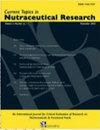在三联抗生素疗法中加入益生菌可改善抗幽门螺旋杆菌引起的消化性溃疡的治疗效果
IF 0.4
4区 医学
Q4 NUTRITION & DIETETICS
Current Topics in Nutraceutical Research
Pub Date : 2023-07-14
DOI:10.37290/ctnr2641-452x.21:473-477
引用次数: 0
摘要
本研究评估了三联抗生素疗法加益生菌对幽门螺旋杆菌诱发的消化性溃疡的影响。为此,将确诊为幽门螺旋杆菌诱发消化性溃疡的患者分为对照组和治疗组。对照组接受标准化的三联抗生素(雷贝拉唑钠、阿莫西林和克拉霉素)治疗,而治疗组还接受连续 14 天的复方嗜酸乳杆菌片治疗。比较了治疗效果(幽门螺杆菌根除率、血清降钙素原、高敏 C 反应蛋白和白细胞介素-8 的表达水平以及不良反应发生率)。治疗组的消化性溃疡有效控制率和幽门螺杆菌根除率明显高于对照组(P < 0.05)。治疗组的促炎指标(降钙素原、高敏 C 反应蛋白和白细胞介素-8)也明显低于对照组(P < 0.05)。此外,治疗组的不良反应发生率也低于对照组,但差异无统计学意义(P > 0.05)。总之,标准化三联抗生素疗法加益生菌能有效改善幽门螺旋杆菌引起的消化性溃疡患者的治疗效果和幽门螺旋杆菌根除率。本文章由计算机程序翻译,如有差异,请以英文原文为准。
Inclusion of Probiotics to Triple Antibiotic Therapy Improves the Outcome of Anti-Helicobacter pylori-Induced Peptic Ulcer
The effects of triple antibiotic therapy plus probiotics on Helicobacter pylori-induced peptic ulcers were assessed. To this end, patients diagnosed with Helicobacter pylori-induced peptic ulcers were divided into control and treatment groups. The control group received standardized triple antibiotic (rabeprazole sodium, amoxicillin, and clarithromycin) therapy, whereas the treatment group also received Compound Eosinophil-Lactobacillus tablets for 14 consecutive days. The treatment outcomes (Helicobacter pylori eradication rate, expression levels of serum procalcitonin, high-sensitivity C-reactive protein, and interleukin-8, and incidence of adverse events) were compared. The effective rate of peptic ulcer control and the eradication rate of Helicobacter pylori were significantly higher for the treatment group than those for the control group (P < 0.05). There was also a significant reduction in pro-inflammatory markers (procalcitonin, high-sensitivity C-reactive protein, and interleukin-8) in the treatment group compared to those in the control group (P < 0.05). Also, the incidence rate of adverse events in the treatment group was lower than that of the control group, but the difference was not statistically significant (P > 0.05). In conclusion, standardized triple antibiotic therapy plus probiotics can effectively improve treatment outcomes and the Helicobacter pylori eradication rate in patients with Helicobacter pylori-induced peptic ulcer.
求助全文
通过发布文献求助,成功后即可免费获取论文全文。
去求助
来源期刊
CiteScore
1.10
自引率
0.00%
发文量
36
审稿时长
>12 weeks
期刊介绍:
Current Topics in Nutraceutical Research is an international, interdisciplinary broad-based peer reviewed scientific journal for critical evaluation of research on chemistry, biology and therapeutic applications of nutraceuticals and functional foods. The major goal of this journal is to provide peer reviewed unbiased scientific data to the decision makers in the nutraceutical and food industry to help make informed choices about development of new products.
To this end, the journal will publish two types of review articles. First, a review of preclinical research data coming largely from animal, cell culture and other experimental models. Such data will provide basis for future product development and/or human research initiatives. Second, a critical evaluation of current human experimental data to help market and deliver the product for medically proven use. This journal will also serve as a forum for nutritionists, internists, neurologists, psychiatrists, and all those interested in preventive medicine.
The common denominator of all of the topic to be covered by the journal must include nutraceuticals and/functional food. The following is an example of some specific areas that may be of interest to the journal. i) Role of vitamins, minerals, antioxidants and phytonutrients on cardiovascular health, cancer, diabetes, ocular health, mental health, men’s health, women’s health, infant nutrition, ii) Role of herbals on human health, iii) Dietary supplements and sleep, iv) Components of diet that may have beneficial effect on human health, v) regulation of apoptosis and cell viability, vi) Isolation and characterization of bioactive components from functional foods, vii) Nutritional genomics, and viii) Nutritional proteomics.

 求助内容:
求助内容: 应助结果提醒方式:
应助结果提醒方式:


